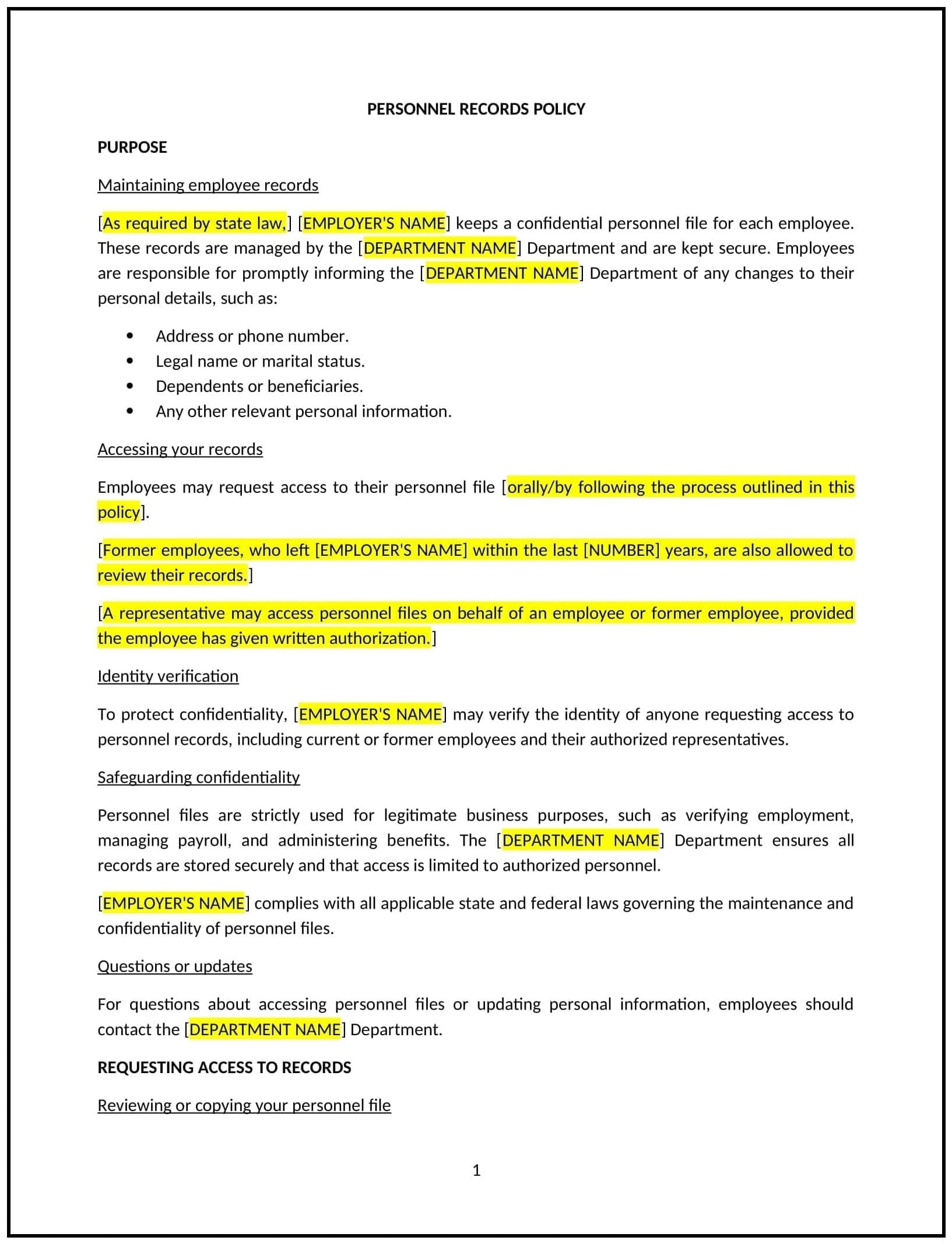Got contracts to review? While you're here for policies, let Cobrief make contract review effortless—start your free review now.

Customize this template for free
Personnel records policy (Iowa)
A personnel records policy helps Iowa businesses manage and protect employee records in a secure and confidential manner. This policy outlines the types of information that should be included in personnel records, how these records should be maintained, and who has access to them. It ensures that employee data is handled responsibly, in line with legal requirements, and with respect to employee privacy.
By implementing this policy, businesses can protect sensitive employee information, foster trust with their workforce, and comply with legal obligations regarding record keeping and data protection.
How to use this personnel records policy (Iowa)
- Define personnel records: Clearly outline what constitutes a personnel record, including items like employment history, performance reviews, pay information, benefits enrollment, and any legally required documentation.
- Set access controls: Establish who within the organization is allowed to access personnel records, typically HR personnel and managers with a legitimate need to know. Specify the procedures for requesting access to records.
- Ensure confidentiality: Implement safeguards to protect the confidentiality of employee records, including secure storage, controlled access, and regular audits to ensure that personal information is not exposed or mishandled.
- Define record retention: Outline how long different types of personnel records should be retained, in line with state and federal regulations. Clearly specify when and how records should be disposed of or archived once they are no longer needed.
- Provide employee access: Define the process by which employees can access their own personnel records, request corrections, or challenge information that may be inaccurate.
- Communicate the policy: Ensure that employees are aware of the personnel records policy and understand how their data will be used, protected, and stored.
- Review and update regularly: Periodically review the policy to ensure it aligns with changes in legal requirements, business operations, and data protection best practices.
Benefits of using this personnel records policy (Iowa)
This policy offers several key benefits for Iowa businesses:
- Protects employee privacy: A clear personnel records policy ensures that employees’ personal information is stored securely and used only for appropriate business purposes.
- Promotes transparency: By setting clear guidelines for how employee data is collected, stored, and accessed, businesses can foster transparency and build trust with employees.
- Reduces legal risks: A well-structured policy helps businesses avoid legal issues related to improper handling of personnel records, including privacy violations and non-compliance with record retention laws.
- Ensures compliance: Adhering to this policy ensures that businesses comply with state and federal laws regarding the handling and storage of employee records.
- Improves operational efficiency: A clear policy streamlines the process of managing employee records, reducing the risk of lost or misfiled information and making it easier to retrieve records when necessary.
- Enhances employee relations: By respecting employees' rights to access and correct their own personnel records, businesses demonstrate a commitment to fairness and respect for privacy.
Tips for using this personnel records policy (Iowa)
- Ensure secure storage: Businesses should store physical records in locked cabinets and secure digital records with encryption or password protection. Only authorized personnel should have access to these records.
- Regularly audit records: Conduct periodic audits of personnel records to ensure that they are accurate, up-to-date, and stored securely. This helps identify any potential security risks and compliance issues.
- Train employees on data protection: Provide regular training for HR staff and managers on the importance of confidentiality, the proper handling of personnel records, and employee data protection.
- Set a clear record retention schedule: Establish clear guidelines for how long records should be kept and how they should be disposed of once they are no longer needed. This helps businesses comply with retention laws and avoid unnecessary clutter.
- Provide employees with access: Ensure that employees can easily access their own records and request corrections or updates to any inaccurate information, fostering a culture of transparency and accountability.
- Implement a process for corrections: Outline a clear process for employees to correct inaccuracies in their personnel records, ensuring that any mistakes are rectified in a timely manner.